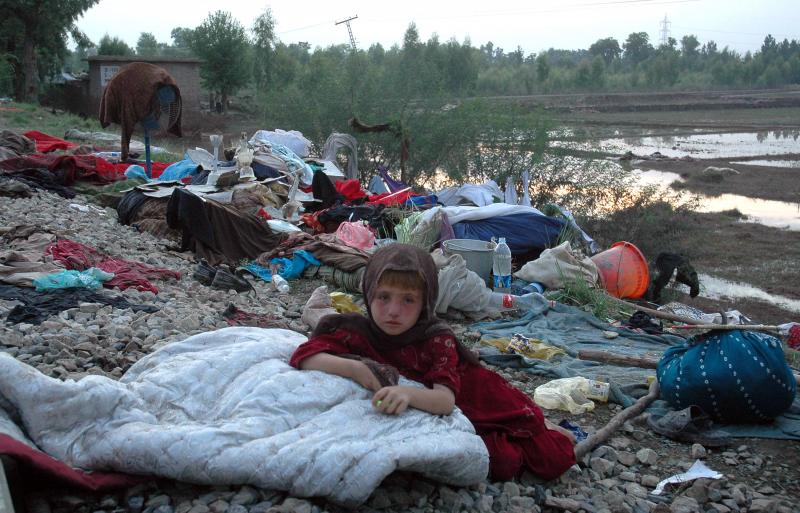
If Shakespeare were to write a tragedy today, it could well begin: “Alas poor Pakistan. I knew it well.” Facing existential economic and security threats, it hardly needed a third, in this case the catastrophic “super flood” that became a massive water sword slashing through Pakistan’s underbelly.
Estimates are that as many as 20 million of Pakistan’s 170 million-180 million citizens could be driven from their land and homes. The consequences are catastrophic. Already excruciating power and food shortages will be even worse. Disease lurks. The World Bank says that Pakistan’s economy could contract by 10-15 percent. In sum, this has become a Katrina affecting the whole country.
The Pakistani army has deployed 60,000 troops and most of its tiny fleet of helicopters to the relief effort. The army maintains that it will still prosecute the battle against insurgents and terrorists with equal vigor. However, given the magnitude of the flood damage and the need for army assistance, it is hard to see how those combat efforts can be sustained.
So far, while the World Bank has offered $900 million in assistance, donations have been a trickle. Perceptions of a dysfunctional Pakistani government, exacerbated by what many see as a state of permanent corruption, aren’t conducive to providing large amounts of relief aid. And Pakistan is also hampered by geography and remoteness.
Contrast the relief effort to Pakistan with that in Haiti over a year ago when earthquakes killed hundreds of thousands of Haitians. Presidents, politicians and celebrities flocked to Haiti. But so far, neither Bill Clinton nor Sean Penn or any members of the galaxy of stars has made this trip. While both catastrophes are extreme examples of humanitarian disasters, the difference is that Pakistan has crucial strategic and geopolitical importance and significance.
Without Pakistan’s active cooperation and collaboration, the chances of success in Afghanistan on the part of the United States, NATO and the Karzai government drop to low double and even single digits. Yet, Pakistan must and will be inwardly focused to cope with this disaster and clearly what will be a shrinking economy in which food and power shortages could provoke riots or worse. And the Taliban and al-Qaida will be exploiting these crises conditions in two diametrically opposed ways.
First, Islamic charities as well as local Taliban have stepped in where the government hasn’t and couldn’t. Second, suicide bombers will have even more vulnerable targets that the government won’t be able to protect or defend given the huge numbers of displaced people. At the same time, opposition political leaders will pound the government for its failure to deal with this environmental nightmare. All of this intensifies the already existential dangers facing the nation.
In the past, the one safeguard Pakistan had was the army, that nation’s most respected institution. It could and did intervene to impose emergency or military rule. In extremis and only in extremis would it likely do so now. But conditions could deteriorate to the point that not even the army would be able to cope with a country in chaos.
What can be done? If the Obama administration is really serious about succeeding in Afghanistan and actually believes that Pakistan is central to that success — and despite the rhetoric coming out of the White House, actions haven’t kept up with promises — it must take dramatic steps. In essence a Marshall-like Plan for the region in general and Pakistan in particular is needed.
Of the plethora of questions that must be answered prior to approving any such plan, given the economic realities at home, the first is where will the money come from? A second is what about the billions already dispatched and the $7.5 billion in the Kerry-Lugar program promised over the next five years? Still, far more money will be needed. If that money cannot be found or the inability to ensure effective delivery of that support negates its impact, one outcome is certain. The Obama administration won’t succeed in Afghanistan without Pakistan.
Part of this Marshall Plan need not require massive funding. As argued before in this column, lifting textile tariffs imposed on Pakistan by shifting quotas from other foreign exporters won’t cost Americans one penny. Sending large numbers of U.S. and not reworked Russian helicopters by taking them from the Reserve and National Guard, as well as other military equipment, is vital. And offering to begin discussions on a nuclear power treaty equivalent to the one signed with India is a further step.
Probably, this won’t not happen. Unlike Haiti, this support will likely be modest and the existential dangers to Pakistan will grow. The prospect of a no-confidence vote could lead to a government not favorably disposed to the United States.
The SOS has been sent. Will it be answered?
Harlan Ullman is Senior Advisor at the Atlantic Council, Chairman of the Killowen Group that advises leaders of government and business, and a frequent advisor to NATO. This article was syndicated by UPI. Photo credit: UPI.
This article is part of the series Pakistan Floods: Hope from Tragedy. To find a series description and links to related posts, please click here.
Image: Pakistan%20floods%203.jpg
